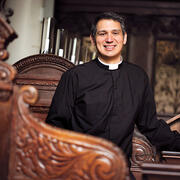
The Reverend Matthew Ichihashi Potts, Plummer Professor of Christian Morals at HDS, and Pusey Minister in the Memorial Church, delivered the following remarks at Morning Prayers in Harvard's Memorial Church on December 1, 2021.
♦♦♦
Today in my church calendar, in the calendar of feasts and fasts in the Anglican communion in the Episcopal church, is the feast day of Nicholas Ferrar. Ferrar was a scholar, courtier, businessman, and ordained deacon in the early 17th century in England. He's most well known as the founder of a small community. Technically, it wasn't really a religious community, but I'll say more about that in a minute. But a small community called Little Gidding, which was made famous in a poem by T.S. Eliot in his Four Quartets. He has one of those poems which is called Little Gidding.
Ferrar was born in 1592 in the city of London to a relatively wealthy family. He was confirmed at age six. Good for him. Went to Cambridge at age 13. Good for him again. But he suffered poor health and when he finished his studies at Cambridge, he was advised by a doctor to depart the damp of Cambridge in England. And he became a courtier in James the First daughter's, Elizabeth. She was married to a man who would eventually become the king of Bohemia and he joined her court on the continent. This lasted for about a month. The life at court did not suit him and he ended up traveling around Europe on his own.
His family got into some trouble in London so he returned to London. They were deeply embroiled in colonial politics. This is the early 17th century, the time of the founding of this university. And the family was deeply invested in the London Virginia Company which was in a big argument with the East India Company. Eventually, the Virginia Company lost its charter and the family moved away from London and they retreated to a small deserted village, a village that had been deserted since the plague about 30 miles northwest of Cambridge called Little Gidding. There were just a few families there. They restored the church and they just lived there. They did good works. They fed and cared for local children and the poor. They bound books. They produced harmonies of the Gospels and bound them and gave them out to people and they were constantly praying.
As I said, they restored the little church and they had a rule. They didn't have many rules in the community, but they had a rule that someone would always be kneeling in the church at prayer every hour of the day. They took the line from scripture, "pray without ceasing," quite literally. And they welcomed many visitors, including Charles the First several times, including after his armies were destroyed by Cromwell and the Puritans after the battle of Naseby. He also published the poet, George Herbert's works.
In some ways, looking at Ferrar's life from one perspective, it is a record of failures. He was very smart, but not renowned as a scholar. He didn't produce lasting works of scholarship. He failed as a courtier, failed as a business person. Failed as a business person, maybe not just financially, but morally. We know the evils of the colonial project into which his family was invested. The religious community he founded was basically just his family. That's why I said, technically, it's not a religious community. His family did this and then after he and his brother died, they dispersed and Little Gidding as it was ended.
So why is he a Saint? Why does my church remember him as a Saint? I think the answer is simple. Simple and also difficult in its simplicity. He's a Saint because he prayed without ceasing. He made his life a life of prayer. His family made their lives a life of prayer. They bound books, bound Gospels to hand them out as a practice of prayer. They fed local, hungry children and cared for the sick in their little deserted village as a practice of prayer. And they knelt in a church and prayed all the time.
I spent this term with you joining you just about every Wednesday, Wednesdays I don't break my foot. I've been with you every week. I've taken up this habit of prayer with you though less faithfully than many of you who are here every day praying. I think prayer, the life of prayer, this is the significance of Nicholas Ferrar. In Eliot's poem, T.S. Eliot's poem, about Little Gidding, he speaks about going up to Little Gidding from London and he talks about what it means to go there and what it means to pray. And he has these beautiful lines where he says, "You are not here to verify, instruct yourself, inform curiosity, or carry report. You are here to kneel where prayer has been valid."
This is what prayer is, not verification, instruction, reportage, the information of curiosity. It is placing yourself within the order of creation which exceeds your understanding. It is a practice of humility and submission. It is a practice of consenting to an order beyond ourselves and placing ourselves in it deliberately.
We have one more week of morning prayer this term. I pray with thanksgiving for you who have made prayer valid in this place and with whom I am glad and honored to kneel and to pray each week. Let us then rise and pray together. The Lord be with you.